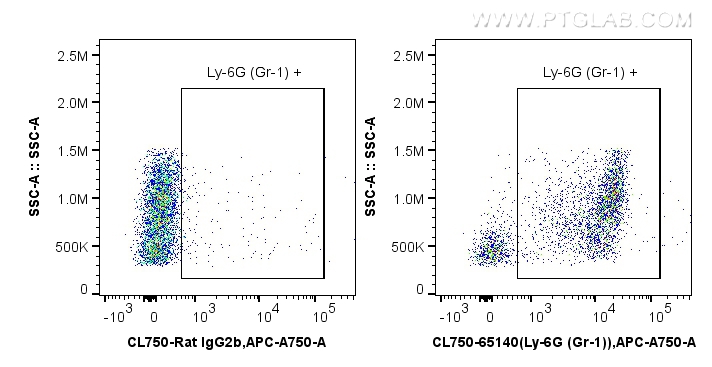验证数据展示
经过测试的应用
| Positive FC detected in | mouse bone marrow cells |
推荐稀释比
| 应用 | 推荐稀释比 |
|---|---|
| This reagent has been tested for flow cytometric analysis. It is recommended that this reagent should be titrated in each testing system to obtain optimal results. | |
| Sample-dependent, Check data in validation data gallery. | |
产品信息
CL750-65140 targets Ly-6G/Ly-6C (Gr-1) in FC applications and shows reactivity with Mouse samples.
| 经测试应用 | FC Application Description |
| 经测试反应性 | Mouse |
| 免疫原 | Raised against granulocytes of mouse origin 种属同源性预测 |
| 宿主/亚型 | Rat / IgG2b, kappa |
| 抗体类别 | Monoclonal |
| 产品类型 | Antibody |
| 全称 | lymphocyte antigen 6 complex, locus G |
| 别名 | Gr1, Gr-1, Ly 6G, Ly6g, Ly-6G (Gr-1) |
| GenBank蛋白编号 | X70920 |
| 基因名称 | Ly-6G |
| Gene ID (NCBI) | 546644 |
| RRID | AB_2935104 |
| 偶联类型 | CoraLite® Plus 750 Fluorescent Dye |
| 最大激发/发射波长 | 755 nm / 780 nm |
| 形式 | Liquid |
| 纯化方式 | Affinity purification |
| UNIPROT ID | P35461 |
| 储存缓冲液 | PBS with 0.09% sodium azide , pH 7.3 |
| 储存条件 | Store at 2-8°C. Avoid exposure to light. Stable for one year after shipment. |
背景介绍
Ly-6G (lymphocyte antigen 6 complex, locus G), also known as Gr-1, is a 21-25 kDa, glycosylphosphatidylinositol-anchored protein expressed on myeloid lineage cells in mouse bone marrow (PMID: 8360469). The expression of Ly-6G increases on neutrophils as they differentiate from immature cells in the bone marrow to mature cells in the blood and spleen (PMID: 8890901). Antibodies targeting Ly6G (RB6-8C5 or 1A8) are commonly used in studies aimed at identifying the role of neutrophils (PMID: 23543767). The RB6-8C5 mAb has been reported to cross-react with Ly-6C on cells expressing Ly-6C (PMID: 8360469).
实验方案
| Product Specific Protocols | |
|---|---|
| FC protocol for CL Plus 750 Ly-6G/Ly-6C (Gr-1) antibody CL750-65140 | Download protocol |
| Standard Protocols | |
|---|---|
| Click here to view our Standard Protocols |
